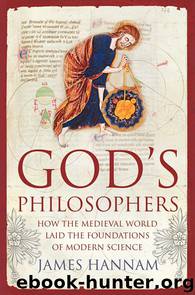God's Philosophers: How the Medieval World Laid the Foundations of Modern Science by James Hannam

Author:James Hannam [Hannam, James]
Language: eng
Format: epub, mobi
Tags: History/Science
Publisher: Icon Books
Published: 2009-08-06T23:00:00+00:00
The Invention of the Printed Book
The development of guns made men better at killing other men. Printing is a pacific invention, but probably changed the world even more than the black powder. Like gunpowder, print originated in the Far East where people had used carved woodblocks and metal type for centuries. In Europe, short religious pamphlets, consisting of little more than a devotional picture and a short explanatory text, appeared in the late fourteenth century. These too used woodblocks. Stationers found that they were only economical for large print runs of standard documents, because they had to cut an entire block that they could not reuse for a different job.
The secret of paper had also travelled from China to Europe during the Middle Ages. Europeans had had to use parchment or vellum as their main writing medium since late antiquity. This is made from animal skins and was ruinously expensive. A paper mill is recorded in central Italy by 1276 and in France by 1348.31 Although it was hardly cheap, paper was already well on the way to replacing parchment by the fifteenth century.
The father of printing was Johann Gutenberg (c.1398–1468), a metallurgist from Mainz in Germany. While the idea of printing was not new and paper already existed as a suitable material, Gutenberg had to make several intuitive leaps that mean we really can celebrate him as the inventor of the modern printed book. His greatest advance was moveable metal type. He cast the type for every letter separately so that the typesetter could rearrange them for each new page. Next, Gutenberg needed an ink that adhered to paper and did not smudge. He experimented with various oil-based inks, before settling on a mixture of soot and turpentine suspended in walnut oil. Finally, he adapted the old-fashioned wine or olive oil press into a device for bringing type and paper together under pressure.32
Gutenberg’s first printed book was a short Latin grammar, but his great Bible of 1455 irrefutably demonstrated the potential of the new technology.33 The Latin alphabet gave European printers a significant advantage over many Asian countries. Because European languages employ only about 25 letters each, a printer needs only a small assortment of type to be able to print absolutely anything. Chinese and other oriental languages have a different symbol for each word, necessitating a vast collection of different type. This rendered the capital cost of setting up a printing operation prohibitive and increased the time required to typeset a page.
The advantages of the printed book went well beyond cost. Of course, they were cheaper than manuscripts, but they were also much more legible. Better still, they had the potential to be more accurate. Unfortunately, poor editing blighted many early printed books. ‘There is always the carelessness of printers to contend with’, one noted writer moaned in his introduction to the Natural History of Pliny the Elder in 1525.34 This meant that errors tended to proliferate through many copies rather than staying confined to a single manuscript. At least this gave publishers a useful marketing tool when no copyright existed.
Download
God's Philosophers: How the Medieval World Laid the Foundations of Modern Science by James Hannam.mobi
This site does not store any files on its server. We only index and link to content provided by other sites. Please contact the content providers to delete copyright contents if any and email us, we'll remove relevant links or contents immediately.
| Africa | Americas |
| Arctic & Antarctica | Asia |
| Australia & Oceania | Europe |
| Middle East | Russia |
| United States | World |
| Ancient Civilizations | Military |
| Historical Study & Educational Resources |
Room 212 by Kate Stewart(5105)
The Crown by Robert Lacey(4807)
Endurance: Shackleton's Incredible Voyage by Alfred Lansing(4769)
The Iron Duke by The Iron Duke(4349)
The Rape of Nanking by Iris Chang(4203)
Joan of Arc by Mary Gordon(4101)
Killing England by Bill O'Reilly(3995)
Say Nothing by Patrick Radden Keefe(3975)
I'll Give You the Sun by Jandy Nelson(3428)
Shadow of Night by Deborah Harkness(3359)
Hitler's Monsters by Eric Kurlander(3328)
Mary, Queen of Scots, and the Murder of Lord Darnley by Alison Weir(3201)
Blood and Sand by Alex Von Tunzelmann(3195)
Eleanor & Park by Rainbow Rowell(3153)
Darkest Hour by Anthony McCarten(3119)
Margaret Thatcher: The Autobiography by Thatcher Margaret(3079)
Book of Life by Deborah Harkness(2931)
Red Famine: Stalin's War on Ukraine by Anne Applebaum(2928)
The One Memory of Flora Banks by Emily Barr(2857)
